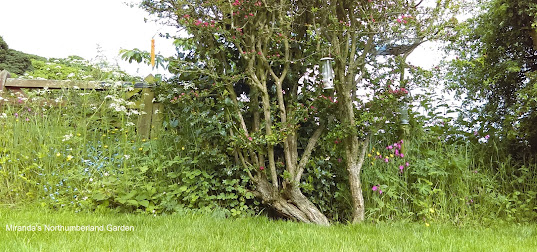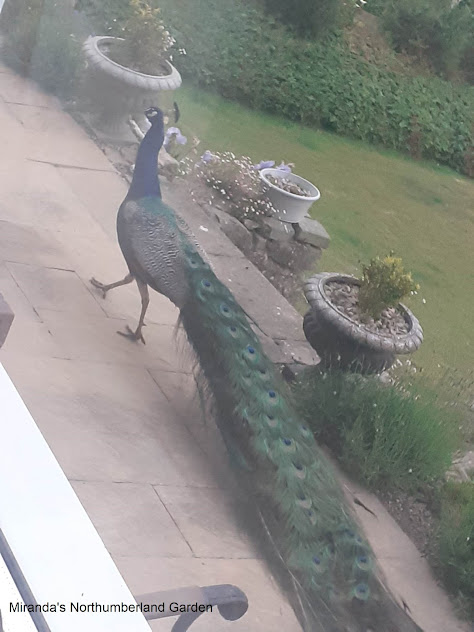Recently, for me gardening-wise, life has been exciting and very eventful. I have been trying more new things in the garden as well as enjoying some lovely day trips to north-east gardens.
The wildflower hedge is always at its best during June/July. Currently in flower are red and white campion,
ox-eye daisies as well as umbelifers, I even spotted some Herb Robert tucked in
amongst the taller plants. I found
some foxgloves seedlings in another part of the garden so quickly transferred
them to the bottom of the hedge.
As the price of vegetables in the shops is still quite high, I am trialling growing salad plants and vegetables in the garden. With the glasshouse primarily being used for growing semi-tropical and tender plants, I start germinating the seeds on the window sill of our south-facing dining room window. Once the first true leaves have appeared I move the seedlings to the east-facing lounge window sill, then once each seedling is bigger enough I pot-them-on and move them to the north-facing garage window sill for hardening off.
Last week, I had a wonderful day coach trip to two fantastic gardens in Cumbria organised by one of the gardening clubs of which I am a member. We visited Lowther Castle and Chapelside in Mungrisdale, both gardens could not be more different from each other. I thoroughly enjoyed visiting these beautiful gardens but more about them another time.
 |
| Lowther Castle |
This summer I am attempting to grow salad crops and vegetables in containers. I have placed various containers within the fruit cage and filled them with home produced compost mixed with shop-bought chicken manure. Growing edible crops in the fruit cage serves two purposes; firstly, I am hoping that the netting will prevent the large white butterfly from laying eggs on the leafy greens; secondly, as I regularly water the fruit bushes using a sprinkler system the containerised plants will be watered at the same time.
 |
| Runner beans growing up the fruit cage supports underplanted by turnip |
Whilst on the subject of the fruit cage. The goji berry did not
produce any fruit last year; I did some on-line research and learnt I should have pruned
its branches in a particular way. This I
have now done. Sadly, the Chilean guava
was badly burned by two severe frosts; I have replaced it with a small fig (Miss Figgy). It is
a compact variety so will be ideal for growing in amongst other fruit bushes. The three blueberry shrubs have not fared
much better, all three have produced very little fruit over the years. They have been replaced by three new blueberries, Vaccinium
corymbosum Julia (harvest time July), Augusta (harvest time August) and Septa
(harvest time September). I have planted them in containers filled with ericaceous
compost and am waiting to see how well they crop. Incidentally, the wild strawberries
are fruiting well at the base of the pots.
I found a lime hawk-moth walking across the drive the other
day, the first I've ever seen in the garden. It was incredibly beautiful and incredibly
big. It fluttered its wings as it walked so this picture was the best I was
able to get. When I picked it up to take
a better photograph, it flew high up into the tree canopy.
One evening, a few weeks ago, my family and I were sitting
in the living room watching television when a shimmering blue/green bird walked
passed the French doors. What a wonderful surprise visitor to have in the garden! He lives in the
grounds of the large country house further down our lane. We often hear his distinctive call and believe
he has been a resident there for several years.
He struts about the garden with poise and elegance, we all would love him
to come visit again.
At this time of year, it is so tempting to spend every
daylight hour working in one’s garden but please do take a few minutes to sit
down, relax and enjoy the sights and sounds of your outdoor space.
Happy gardening, till next time.









No comments:
Post a Comment